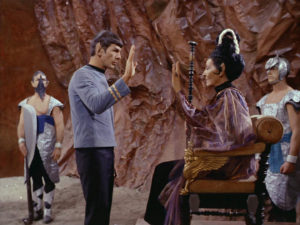Archive for the newepisodes tag
Ari
June 8, 2016
Episode 36 – TOS 2×07: “Catspaw”
Just to give you an idea of our impressions for this week, most of our notes for this episode consist of repeated interrobangs and the word “WITCHES?!?!” underlined multiple times.
It’s best not to try and view this episode through much of a critical lens. There’s some vague Macbeth references. There’s a few places where mostly you want to hear the Nightmare Before Christmas intro song. There is a sexy cat lady who is also, at times, an actual cat (the first of at least two Sexy Cat guest stars in TOS, believe it or not). There is my only enduring childhood memory of this episode: the U.S.S. Enterprise encased in a block of clear plastic.
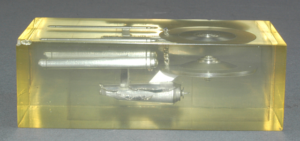
So that’s what’s there. So what’s not there? Is it a coherent explanation of who or what our villains are or what they’re after? DING DING DING CORRECT. We have no idea why two aliens who apparently invaded our dimension with (yet another) assistive machine that grants them nearly-invincible powers of illusion and impact do any of the things they do, least of all why they might kidnap a bunch of humans from a passing starship and imprison them in a castle straight out of some movie lot’s Scary Halloween Tour.
What we do know is that apparently their true forms look like this:
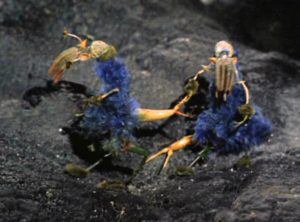
…yeah, we’re as confused as you are.
Podcast: Play in new window | Download | Embed
Subscribe: Apple Podcasts | Email | RSS
Ari
June 1, 2016
Episode 35 – TOS 2×06: “The Doomsday Machine”
This week’s episode is another in a long line of Almost A Very Good Episode. It opens on the Enterprise discovering yet another destroyed solar system that they swear was there only a year ago, and the missing U.S.S. Constellation, whose crew seems to have vanished into thin air.
Sounds great, right? Really, this story’s got all the makings of something we should love. There’s an unfeeling, impossible foe from beyond the edge of the galaxy; death and destruction on an almost incomprehensible scale; and a moving monologue on what it means to be Captain of a starship – both from Kirk and from the Captain of the drifting Constellation, whose crew was tragically destroyed along with the now-devoured third planet. The faceless foe from beyond the galaxy also looks just like a delicious cream horn.
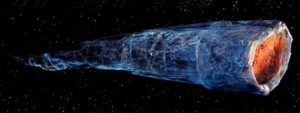
We enjoy the classic feel of the monster of the week: a wandering, automated planet-killer from so far away and so long ago we’ll likely never know what set it on its path. We like the thinkiness of the ultimate solution, and how while definitely gibberish it at least mostly makes sense: we do love when our crew manages to Science their way out of a problem. We’re fascinated by the period-brave (albeit brief) discussion of suicide (trigger warning, btw) and the way Decker slowly falls apart in the aftermath of his crew’s death.
There’s almost some very good strategy that goes into the eventual defeat of the Cream Horn, a mostly-neat bit of to-ing and fro-ing between the two damaged ships and a shuttlecraft (which ultimately succumbs to Countdown Fatigue when the last fateful beam-out is interrupted by cheerful little flashbangs and Scotty cursing in a Jefferies Tube leading to us all shaking our fists and yelling “oh, come on at the screen).
It’s just that we hate Decker, so, so much.
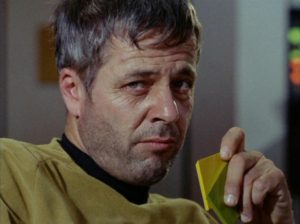
We’re supposed to feel sorry for this guy, and at first, we do. He’s lost his crew because he did the right thing: he got them off a failing ship and stayed behind. “That’s what the Captain’s supposed to do, isn’t it?” he asks Kirk, in the episode’s most genuinely gutting moment. There’s a brief throwaway line before and after that Decker and Kirk were once friends, but it seems everyone forgets about that immediately, because from that moment on, Decker is in a revenge-driven down-spiral that starts with him taking control of the Enterprise when Kirk ends up stranded aboard the damaged Constellation, is followed by his risking Kirk’s ship and crew in a series of idiotic, abortive suicide runs, and culminates in a space-homage to Captain Ahab, with Decker taking a shuttlecraft right into the mouth of the monster and blowing himself to kingdom come.
We can’t speak for the Enterprise crew, but at least by the NSMTNZ crew, he will not be missed.
Podcast: Play in new window | Download | Embed
Subscribe: Apple Podcasts | Email | RSS
Ari
May 25, 2016
Episode 34 – TOS 2×05: “The Apple”
This week’s episode… I’m gonna be honest with you: it asks no coherent questions, provides no lucid answers, but does involve a massive, probably-malevolent snake-computer. So… there’s that.
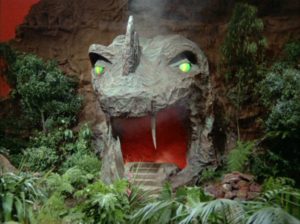
There’s a lot of Garden of Eden metaphors sprinkled vaguely throughout this story, though the operative word here is “vague.” Our brave (and frankly kind of stupid) away team beams down to a planet that they liken to paradise: constant, hospitable temperatures from pole to pole, fertile soil “ripe for husbandry” (and the awkward sex references just keep on coming), beautiful flowers that will murder you as soon as look at you (and will happily do both), exploding rocks, and a small but thriving population of spray-tanned slaves/worshipers who would look more at home in Willy Wonka’s Chocolate Factory than the stereotypical grass-hut village they’ve been placed in for… whatever reason. It’s unclear. To feed Vaal? Vaal apparently really likes space melons.
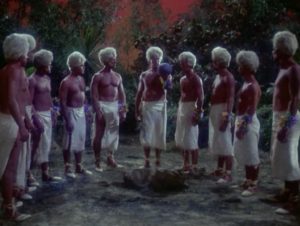
If you couldn’t tell, the consensus was that this was a pretty bad episode. On the face of things, it seems like the kind of episode that at least two of us should enjoy: evil computers! Wacky hijinks in an alien wilderness! Enterprise-threatening peril on a countdown clock! But it all comes apart before it even begins, largely because nobody involved in the writing of this episode could decide what metaphor they wanted to explore.
And unlike previous similar stories where the heroic Enterprise crew comes in and rescues a “primitive”/enslaved/oppressed population from evil computers/”barbaric” cultural practices/themselves, in this case the child-like Feeders of Vaal are left, at the end of the episode with basically a “good luck, see you never!”
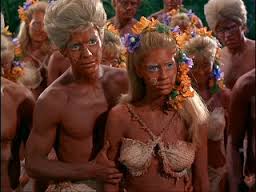
We spend a lot of episodes just trying to figure out what painfully-transparent moral we’re supposed to be left with at the end, and while the Eden imagery was coming on strong, we’re only like 45% that the metaphor fits. We can agree on one thing, though: perfect innocence is overrated, and nobody really wants to live in a garden forever.
Podcast: Play in new window | Download | Embed
Subscribe: Apple Podcasts | Email | RSS
Ari
May 18, 2016
Episode 33 – TOS 2×04: “Mirror, Mirror”
Are you excited? You should be! This week, we embark on one of the Trek universe’s most beloved continuing storylines: The Mirrorverse!
The Mirrorverse. Where real men wear sparkly gold sashes, real women have intimidating She-Ra abs and murderbiceps, and literally anyone of any gender (non-binary murder-bling not pictured) will knife you for a donut.
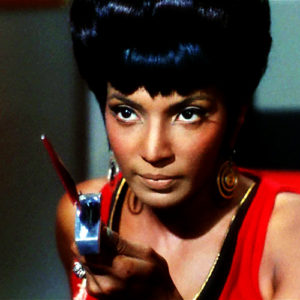
The Mirrorverse has multiple episodes across every Trek series, and the premise is simple: something important in the past went juuuuust differently enough that the Federation never happened. Instead, at least as far as TOS goes, we instead got the Terran Empire, a culture in which humans aren’t the squishy, peace-loving socialists of the prime universe, but something decidedly more Klingon-like, and explicitly the bad guys.
Kirk, Uhura, Scotty and Bones end up there via a transporter accident (originally by switching bodies with their doubles, but later on the alternate-universe travel to the Mirrorverse is just straight-up travel via transporter) and have to act like their bad-guy doppelgangers to buy time to get home. Back in the real world, Spock is not fooled by dark!Kirk, Uhura, Scotty and Bones for a second; they spend the episode locked in the brig, because Spock is a highly competent officer.
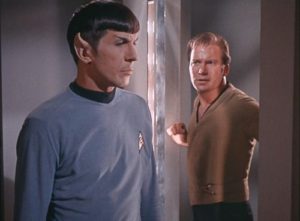
Later on in the Trek timeline, the Mirrorverse changes drastically as a direct result of Kirk & Co’s visit – he sows a seed of doubt in Spock about the long-term viability of the Empire, and Spock ends up overthrowing and reforming the Empire to something more peaceful and progressive… which is promptly overthrown by external forces. Whoops.
We all three loved this episode, from Imperial Starfleet’s hilarious murderbling to Uhura’s incredible battle-crop-top and washboard murderabs (and literally everything Nichelle Nichols does in this episode, who are we kidding) to dark!Spock’s famous evil goatee. I could list more, but we’d be here all day. The Mirrorverse: the gift that keeps on giving.
Podcast: Play in new window | Download | Embed
Subscribe: Apple Podcasts | Email | RSS
Ari
May 11, 2016
Episode 32 – TOS 2×03: “The Changeling”
So if the plot of this week’s episode feels familiar, that’s because it formed the basis of the first Star Trek movie, Star Trek: The Motion Picture: the Enterprise encounters an ancient, Earth-built space probe that promptly tries to kill them.
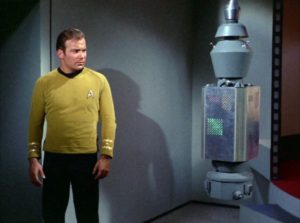
It’s a theme often-repeated in later Trek. A probe, originally sent out by ancient Earth scientists (ancient to the Enterprise, but pretty-far-future to the writers of the ep), designed to do scientific research, is believed lost or destroyed. But surprise! The probe – in this story, called Nomad – is intact, and on its way home to Earth, but has been altered by accident or by the design of a more advanced civilization, its original, benign purpose warped into something destructive and dangerous. Nomad‘s new mission, by the time it encounters the Enterprise, is to destroy all biological “infestations.” You know… like the human race.
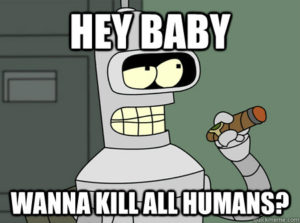
Prior to encountering the Enterprise, Nomad has wiped out at least 4 planets’ worth of people, and post-encounter, it kills off at least four redshirted security officers (minus sensible engineer Mr. Singh, who survives mainly due to rational fear), plus temporarily murdering Scotty (and then rebooting him, nbd) and mind-wiping Uhura (also apparently nbd, despite the extremely problematic nature of the only woman of colour in this episode being the character to temporarily turn into a vegetable??). Despite a cold open with a body count higher than a Garth Nix novel, and Nomad’s stated intention of wiping out the population of the planet Earth, the stakes do not feel particularly high, at least not judging by the attitudes of the command staff.
There’s also a mostly-buried metaphor about the probe as a faerie changeling – see the title – which casts Nomad as the human child stolen by the faeries and replaced by an impostor. We started out pretty skeptical about this mostly-pretty-shaky premise, but mostly talked ourselves around to it pretty early on. Human beings have an intense emotional connection to the little bots and other machines we send out into the darkness to explore places we can’t go – watch any video of the reaction to the Philae touchdown, or follow the Curiosity rover’s Twitter account – perhaps because they can go places we can’t. So for one of them to return changed beyond all recognition, or to return with a dark purpose, is genuinely distressing (at least, to us).
Let’s hope that if any real space probes ever return home (presently unlikely – real space probes are sent out with no intention of recall), they’re pleased to see us, the descendants of those who sent them out into the universe.
***
We apparently skipped over the counts part of the episode for this one, so here they are: Deaths: approximately four billion (that we know of); eight ladies, 6 POC.
Podcast: Play in new window | Download | Embed
Subscribe: Apple Podcasts | Email | RSS
Ari
May 4, 2016
Episode 31 – TOS 2×02: “Who Mourns for Adonais?”
This week’s special guest-host, Trisha, summed up the episode pretty nicely: “hand jobs and sexism.”
In this episode, our brave crew finds themselves on a planet with a seemingly all-powerful being to claims to be one of the ancient Greek gods. The relationship does not begin in a way we can define as “smooth;” namely, said god reaches out a giant green space-hand to grab the ship, and then introduces himself by means of projecting his giant head into space to start delivering orders.
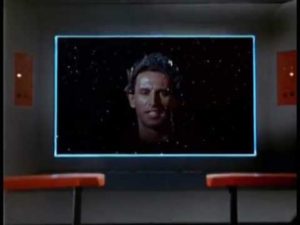
What follows is a genuine shitshow of carelessly sexist nonsense in which our sole lady guest star falls so head-over-heels inexplicably in love with said ancient short-skirted deity that his command that the Enterprise crew abandon ship and become simple sheep herders and him-worshipers seems like, y’know, no big deal.
To be fair, there are some interesting beats in this episode: the Ray Harryhausen-esque effects; a number of semi-interesting mythology-as-sci-fi nods that feel very like they may have informed the basis of the Stargate franchise, and of course, let’s not forget the frankly amazing costumes worn by guest stars Michael Forest and Leslie Parrish (miracles of fashion and engineering).
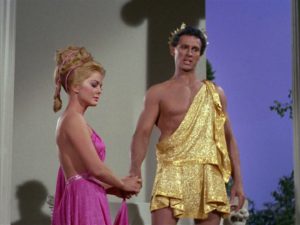
We talked a lot more about the definition of a god than you might expect for an episode we all so roundly disliked, but for the most part the takeaway was outrage at the idea that some alien with some fancy tricks might set himself up as lord and commander of our destinies; we’re intelligent, sentient beings with a spaceship, damn it. As it happens, James Kirk agrees with us, as his face throughout most of the episode is this one:
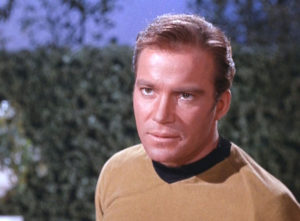
Podcast: Play in new window | Download | Embed
Subscribe: Apple Podcasts | Email | RSS
Ari
April 27, 2016
Episode 30 – TOS 2×01: “Amok Time”
In the season 2 premiere, we travel to sunny Vulcan for the most extended, uh, completion metaphor in 1960s television.
Or, you know, Spock is undergoing a Special Change and really, really doesn’t want to talk about it.
If the above two sentences haven’t already given it away, yes, this is that episode; the 50 minutes that launched a million Aliens-made-them-do-it/f*ck-or-die fics, and at once, some of the most thoughtful and interesting insights into Vulcan culture in the Original Series. Spock unexpectedly finds himself undergoing Pon Farr, a beautiful and natural process that uh, drives young Vulcans to mate, or expire. Spock needs to go home to rejoin his betrothed, and in the meantime, he’s undergoing some personality changes that make life aboard a cramped spaceship a little awkward, to say the least.
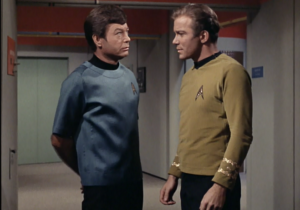
Of course, duty intervenes: the Enterprise has been called to some fancy diplomatic Thing, and can’t make the course correction to drop Spock off at home. Not to mention: Kirk’s not really wild about the idea of losing his bff the finest first officer in the fleet to an arranged marriage. But to Vulcan they go, against orders, and it turns out that things are even more complicated than Spock said they were, because his intended bride has found someone else she’d rather Pon the Farr with. And if Spock really wants her, he’s going to have to engage in a battle to the death.
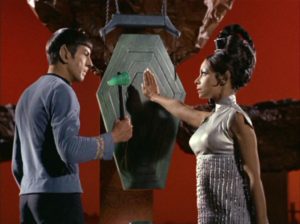
Said betrothed, T’Pring, though, has this all under control. Instead of letting her new fiancee battle and probably kill Spock, she chooses a new champion… and the champion she picks is Kirk.
Let’s all say it together now: awwwwwwk-waaaarrd.
This episode has some great lady guest stars in the form of Spock’s intended, T’Pring (portrayed by Arlene Martel), and most notably, famous Vulcan diplomat, judge, philosopher, and matriarch T’Pau (portrayed by Celia Lovsky).
This episode also contains the first on-screen instance of the Vulcan salute, which has continued to appear in Star Trek franchises for nearly 50 years now.
***
We are now on Google Music’s podcast directory! You can find us via search, or click here to subscribe.
Podcast: Play in new window | Download | Embed
Subscribe: Apple Podcasts | Email | RSS
Ari
April 20, 2016
Episode 29b – Bonus Content: New Series Rumour Round-Up #1
A new-this-week round-up of the current rumours circulating around the new Trek series, gathered for your listening pleasure from only the finest second-hand, uncorroborated sources. We’ll probably keep doing these as we learn more.
We sum up with a reading of our wildest, most unlikely desires for new Trek. Have any of your own?
Podcast: Play in new window | Download | Embed
Subscribe: Apple Podcasts | Email | RSS
Ari
April 13, 2016
Episode 29a – Bonus Content: Star Trek Kiss, Marry Kill
We’re taking a brief hiatus before beginning Season 2, so here is some bonus content to tide you over.
Yes, this is what that title says it is. This is a thing that has happened.
Enjoy?
Podcast: Play in new window | Download | Embed
Subscribe: Apple Podcasts | Email | RSS
Ari
April 6, 2016
Episode 29 – TOS 1×29: “Operation: Annihilate!”
In the first season finale of Star Trek: TOS, the Enterprise goes to war against murderous sun-dried jellyfish.
Investigating a two-century-long wave of mass insanity that’s destroyed at least three civilizations, our fair ship arrives at Deneva, a long-established colony planet that has been out of Federation contact for over a year. Deneva also happens to be home to Kirk’s brother, Sam, and his family. Naturally, Jim and Sam haven’t spoken in years. And neither the planetary government or Sam’s private number are picking up the phone. Worried about his family but in typically-emotionally-constipated fashion, Kirk’s a little short with Uhura over their inability to raise the colony, but Uhura is having none of it.
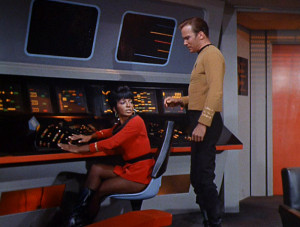
After an encounter with a suicidal one-man ship that flies into the Denevan star screaming “I’m freeeeee!,” the Enterprise books it into orbit and beams down an away team to investigate. Most of the population is unconscious inside of buildings, apart from a few roaming violent mobs, who are easily dispatched by phasers. A scream in the distance leads the team to Sam Kirk’s house, where they find Kirk’s sister-in-law Aurelan, still screaming and basically losing her shit, a tragically dead Sam, and their improbably-ginger son, Peter, who is unconscious.
This might sound like the setup for a really great emotional story arc, but unfortunately after another five minutes the fact that Kirk’s last living family is mostly dying or dead more or less drops off of the motivational radar. This is because after a brief interlude where Aurelan graces us with a brief infodump – “they’re making us build ships! you can’t let them win!” – before simply dying, and Bones admits that he has no idea what’s going on, another trip down to the planet results in Spock being attacked and infected by the villains of the week: the murderous, mind-controlling flying sun-dried jellyfish that have been controlling the colonists for months.
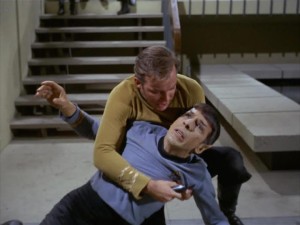
That sounds ridiculous, but guys, these things are extremely disturbing. IMHO the creepiest – certainly most organic – creatures we’ve seen in Trek so far (I invite you to Google them, but they are genuinely revolting). Moreso once they’re analyzed and it’s discovered that these things are neural parasites which after stinging their hosts – like the Kirks, and Spock, and the million Denevans below – control them with excruciating pain. They’re also each a single cell of one big brain that has been sweeping from system to system for at least the last two centuries. Bones has no cure, and no suggestions. Everyone is on edge. The parasites can’t be allowed to spread, but if they can’t free Deneva from their control, Kirk will have no choice (apparently?? this seemed a little 0-to-massacre for a Federation policy???) but to destroy the colonists, Spock, and his young nephew, in order to protect the rest of the galaxy.
Again, this sounds like it should be a really great, emotionally interesting episode. And it is, but Kirk’s family is pushed swiftly and unsubtly into the background so that all of the crew’s emotional energy (especially Kirk and Bones, obviously) can be focused on Spock’s predicament and Kirk and Bones’ angst about it. There’s even a deleted scene (the only one in which Peter talks) where Kirk and his nephew talk about the kid’s future, which was removed because, idk, it was deemed unnecessary?
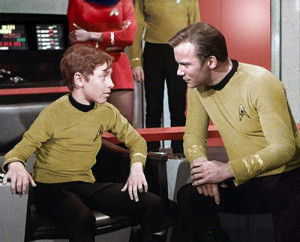
This feels really, really clumsy? Though in terms of the Golden Trio of Original Trek, it at least makes some sense. Kirk seems to be pretty disconnected from the typical emotional bonds with his blood family, and his surrogate family is the Enterprise crew. It takes a while for this ensemble-cast/family vibe to really solidify – some might say not until the films – but in our opinion, it’s worth waiting for.
***
Public service announcement: we will be going on a brief hiatus before we start Season 2. Fear not, for we have already started recording! But 2/3 of us are going to ECCC next week and also there’s a brand-new theme song coming down the pipe for you guys. See you soon!
Podcast: Play in new window | Download | Embed
Subscribe: Apple Podcasts | Email | RSS
